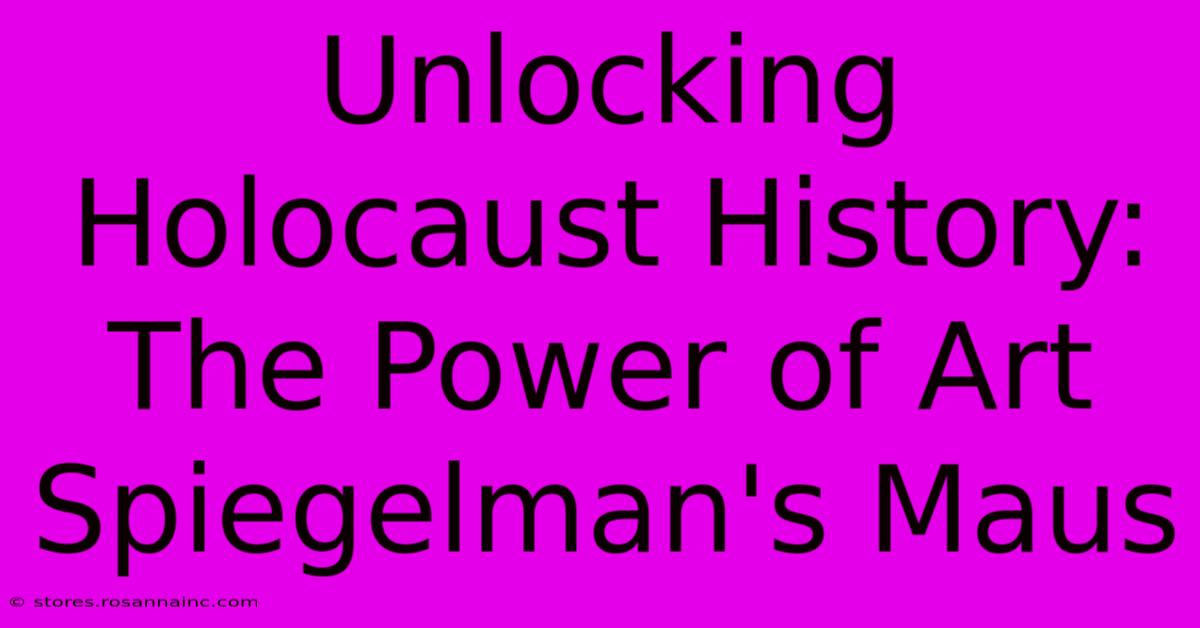Unlocking Holocaust History: The Power Of Art Spiegelman's Maus

Table of Contents
Unlocking Holocaust History: The Power of Art Spiegelman's Maus
Art Spiegelman's Maus, a graphic novel unlike any other, has profoundly impacted our understanding of the Holocaust. It transcends the limitations of traditional historical narratives, offering a deeply personal and emotionally resonant exploration of trauma, memory, and the enduring legacy of genocide. This groundbreaking work utilizes the unique visual language of comics to delve into the complex relationship between Spiegelman and his father, Vladek, a Holocaust survivor. Its impact stems from its innovative approach, powerful storytelling, and unflinching portrayal of unimaginable suffering.
A New Perspective on History: The Genius of Graphic Storytelling
Maus isn't just a history book; it's a testament to the power of graphic storytelling. By representing Jews as mice, Nazis as cats, and Poles as pigs, Spiegelman creates a metaphorical world that simultaneously distances and intensifies the narrative. This allegorical approach allows him to explore the brutality of the Holocaust without resorting to explicit graphic depictions of violence, while still conveying the profound emotional weight of the events. The visual storytelling enhances the reader's emotional engagement, forcing a confrontation with the horrors of the past in a unique and impactful way.
Beyond the Narrative: Exploring Themes of Trauma and Memory
The graphic novel is not simply a historical account; it’s a deeply personal exploration of the intergenerational trauma caused by the Holocaust. Spiegelman's interviews with his father, Vladek, are interwoven with his own struggles to understand his father's experiences and his own complicated relationship with him. The narrative delicately balances the historical context of the Holocaust with the personal struggles of a son grappling with his father's past. This intimate portrayal of trauma and memory adds another layer of complexity, making Maus a profoundly moving and humanizing work.
Key themes explored in Maus include:
- Intergenerational trauma: How the experiences of the Holocaust continue to affect subsequent generations.
- Memory and storytelling: The challenges of preserving and transmitting traumatic memories.
- Father-son relationships: The complex dynamics between Vladek and Art, reflecting the broader impact of the Holocaust on family structures.
- The nature of survival: The different ways in which individuals cope with and navigate the trauma of survival.
- The representation of trauma: The innovative use of graphic narrative to portray the unspeakable.
The Lasting Impact and Critical Acclaim
Maus has garnered significant critical acclaim, winning a Pulitzer Prize in 1992 – a landmark achievement for a graphic novel. Its impact extends beyond literary circles, influencing how we teach and understand the Holocaust. Its accessibility and innovative approach have made it a vital resource for educators, students, and anyone seeking a deeper understanding of this crucial historical event. The work has sparked countless discussions and analyses, cementing its place as a cornerstone of Holocaust literature.
Why Maus Remains Relevant Today
In a world still grappling with prejudice, hatred, and violence, Maus serves as a stark reminder of the dangers of unchecked intolerance. The graphic novel's exploration of the Holocaust's devastating consequences remains profoundly relevant in today's society, prompting vital conversations about empathy, historical understanding, and the fight against all forms of oppression.
The enduring significance of Maus lies in its ability to:
- Humanize the victims: By portraying the victims of the Holocaust as individuals with complex lives and emotions, Maus counters dehumanizing stereotypes.
- Challenge conventional historical narratives: The graphic novel’s unique approach offers a fresh perspective on historical events.
- Inspire empathy and understanding: By sharing the experiences of Holocaust survivors, Maus fosters empathy and a deeper understanding of the Holocaust’s impact.
- Promote critical thinking: Maus encourages critical thinking about historical narratives, memory, and trauma.
Maus is more than just a graphic novel; it's a powerful and moving exploration of history, memory, and the enduring legacy of the Holocaust. Its innovative approach to storytelling and its unflinching portrayal of trauma continue to resonate with readers and scholars alike, making it a timeless masterpiece that demands to be read and understood. Its impact on our understanding of the Holocaust and the human experience is undeniable, solidifying its place as a crucial work of historical and literary significance.

Thank you for visiting our website wich cover about Unlocking Holocaust History: The Power Of Art Spiegelman's Maus. We hope the information provided has been useful to you. Feel free to contact us if you have any questions or need further assistance. See you next time and dont miss to bookmark.
Featured Posts
-
George C Scotts A Christmas Carol A Must See Holiday Classic
Feb 10, 2025
-
Escape To Makeout Creek Your Hidden Sanctuary
Feb 10, 2025
-
Agression Jack Lang Images Choquantes
Feb 10, 2025
-
Beyond The Clouds Mastering Everest Base Camp Altitude
Feb 10, 2025
-
Rahal Letterman Lanigan Racing Under Fbi Scrutiny Details Emerge
Feb 10, 2025
